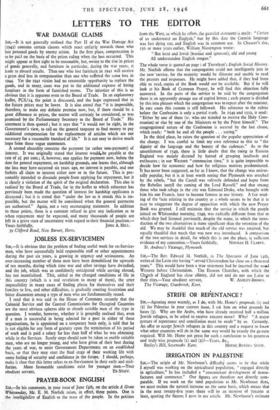LETTERS TO THE EDITOR
WAR DAMAGE CLAIMS •
SIR,-It is not generally realised that Part II of the War Damage Act (1943) contains certain clauses which react unfairly towards those who lost personal goods by enemy action. In the first place, compensation is to be paid on the basis.of the prices ruling when the loss occurred. This might appear at first sight to be reasonable, but, owing to the rise in prices of goods generally, and furniture in particular, during the war years, it leads to absurd results. Thus one who lost furniture in 1941 will receive a great deal less in compensation than one who suffered the same loss in 1944. Yet the 1941 victim had no reasonable oppofttmity to replace the goods, and in many, cases was put to the additional expense of hiring furniture in the form of furnished rooms. The injustice of this is so obvious that it is apparent even to the Board of Trade. In an explanatory leaflet, PCS/14, the point is discussed, and the hope expressed that in the future prices may be lower. It is also stated that " it is impossible, therefore to make any definite premise now, but, if there should be a great difference in prices, the matter will certainly be considered, as was promised by the Parliamentary Secretary to the Board of Trade." His statement is then quoted ; but it says that "it would not be right, in the Government's view, to call on the general taxpayer to fmd money to pay additional compensation for the replacement of articles which are not necessary for a reasonable Standard of life." It is not easy to derive much hope front- these vague statements.
A second absurdity concerns the payment (or rather non-payment) of interest. It was originally stated that interest would, be payable at the rate of 21 per cent.; if, however, one applies for payment now, before the date for general repayment, on hardship grounds, one learns that, although the loss may have occurred six years ago, no interest is payable, and one forfeits all claim to interest either now or in the future. This is pre- sumably intended to dissuade people from applying for repayment, but it is dearly a violation of the spirit of the original declaration. This also is realised by the Board of Trade, for in the leaflet to which reference has previously been made the question of interest for hardship applicants is discussed; but it is stated that " under the law as it stands this is im- 'possible, but the matter will be considered when the general payments are authorised." Again, not a very encouraging statement. In addition to these points, there is a constant refusal to give any indication as to -when repayment may be expected, and many thousands of people are left in a grave state of uncertainty with regard to their financial position.—
Yburs faithfully, JOHN A. HILL. 39 Clifford Road, New Barnet, Herts.






























 Previous page
Previous page